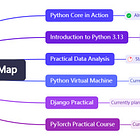6 Python 3.13 Standard Libraries: Master Core Components for Faster Programming
Explore the Python 3.13 Standard Library, packed with built-in functions, modules for text processing, networking, data persistence, and more to simplify coding.
Welcome to the "Introduction to Python 3.13" Series
The Python Standard Library is a core component of the Python programming language, offering a rich set of modules and functionalities that span a wide range of areas, from text processing to network programming and database operations.
This article delves into the main components of the latest Python 3.13 Standard Library.
1. Built-in Functions and Constants
Python 3.13 includes numerous convenient built-in functions and constants that form the foundation for writing Python code.
2. Text and Binary Data Handling
Python provides robust tools for handling text and binary data.
3. File and Directory Access
Python offers a wide range of functionalities for file and directory operations.
4. Network Programming
Python provides powerful networking capabilities.
5. Data Persistence
Python supports various data persistence methods.
6. Other Key Modules
In addition to the above, the Python Standard Library includes many other essential modules, such as:
datetime: Date and time handlingcollections: Container data typesjson: JSON encoding and decodinglogging: Logging capabilitiesmultiprocessing: Multi-process programmingthreading: Multi-threadingsubprocess: Subprocess management
Conclusion
The Python 3.13 Standard Library is a powerful toolkit that provides developers with a wealth of built-in modules and functions, significantly simplifying the programming process. Mastering these modules is key to becoming an efficient Python developer. This article only provides a brief overview of some key modules, and readers are encouraged to consult the official documentation for more comprehensive and detailed information.










